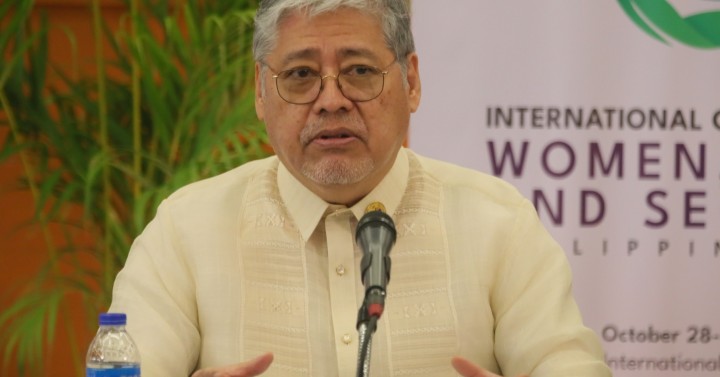Headline: Philippines Champions Women’s Inclusion in Climate Action at COP29
The Philippines Advocates for Gender Equality in Climate Efforts Ahead of COP29
In a significant move towards integrating gender considerations into climate action, the Philippines has pledged to enhance women’s inclusion in all climate policies at the upcoming 2024 United Nations Climate Change Conference, or COP29, set to take place in Baku, Azerbaijan from November 11-22, 2024. Foreign Affairs Secretary Enrique Manalo made this commitment during a press conference on October 30, 2024, held alongside the 2024 International Conference on Women, Peace, and Security (ICWPS) in Pasay City.
The recent adoption of the Pasay Declaration—a document endorsed by representatives from over 70 nations—served as a critical reference point for Manalo’s statements. "The Philippines is hopeful that the Pasay Declaration will help shape state actions, guide policy reforms, and foster greater accountability in advancing gender-responsive peace and security frameworks,” stated Manalo. This declaration embodies a collective commitment to ensure that climate strategies are considered through the lens of gender equality, promoting women’s leadership roles in these initiatives.
The Importance of Gender Inclusion in Climate Negotiations
The emphasis on women’s involvement in climate action comes at a time when global leaders are increasingly recognizing the unique challenges that climate change poses to women, particularly in vulnerable communities. According to the Global Women Leaders, there is a pressing need to give the gender agenda "the importance it deserves" within climate negotiations. This perspective aligns with the broader aims of COP29, where Azerbaijan, as the conference president, has committed to driving actions across various climate pillars, including energy, finance, agriculture, and the intersection of climate with peace.
Ping-ponging from discussions at the ICWPS, the Philippine Commission on Women Chairperson, Emerlita Valdeavilla, highlighted the exacerbating pressures climate change puts on women, pushing them "farther to the edge of disadvantage." She articulated the need for genuine action, stating, “We need to match our commitments with transformative actions that deliver results, impacts around the Sustainable Development Goals (SDGs).”
Key Highlights from the Pasay Declaration
The Pasay Declaration serves not only as a pledge but also as a roadmap for actionable reforms. Its core commitments include:
-
Integration of Gender-Responsive Approaches: States are encouraged to ensure that climate action policies are designed with gender considerations at the forefront.
-
Promotion of Women’s Leadership: The declaration calls for sustainable funding mechanisms that support women in leadership roles specific to climate resilience and disaster risk reduction.
- Accountability in Implementation: A focus on fostering accountability among states to achieve the outlined gender-responsive strategies in climate initiatives.
These commitments are crucial as they shift the narrative around climate change to include the voices and expertise of women, who often bear the brunt of environmental degradation but are frequently absent from decision-making tables.
Challenges Facing Gender and Climate Goals
As the world faces a looming deadline for achieving the SDGs by 2030, valiant endeavors to incorporate gender perspectives in climate negotiations must be met with tangible outcomes. Valdeavilla emphasized that many of the goals tied to gender equity, peace and security, and climate action are unlikely to be realized unless there is a concerted effort to translate commitments into significant actions.
Looking Ahead: The Role of Technology
The implications for the technology sector are profound, as digital innovation can streamline data collection and communication efforts surrounding gender-inclusive climate strategies. Advancements in technology will be vital for supporting women’s leadership in local climate action initiatives, offering tools for collaboration, advocacy, and knowledge-sharing.
As COP29 approaches, all eyes will be on the Philippines and its allies to see how they will leverage the Pasay Declaration and advocate for policies that harmonize gender equality with climate action. The climate crisis transcends borders, and the incorporation of diverse perspectives, especially from women, is fundamental to crafting solutions that are equitable and effective.
Engagement from tech innovators and the general public is pivotal, inviting readers to consider how they can contribute to gender-responsive climate strategies in their communities. What are your thoughts on the role of women in climate action? How can technological advancements support these initiatives? Share your insights in the comments below!
For more information on climate action and gender equality, check out further resources from authoritative outlets such as TechCrunch, The Verge, or Wired.


![[Difficult to obtain!!]Nike ✈︎Embroidery Arch Logo Arizona Yurudabo Brushed mail order by ★Secondhand clothing store KURO★ Follow discount | Nike at Rakuma [Difficult to obtain!!]Nike ✈︎Embroidery Arch Logo Arizona Yurudabo Brushed mail order by ★Secondhand clothing store KURO★ Follow discount | Nike at Rakuma](https://img.fril.jp/img/721305923/l/2415814118.jpg?1730287050)